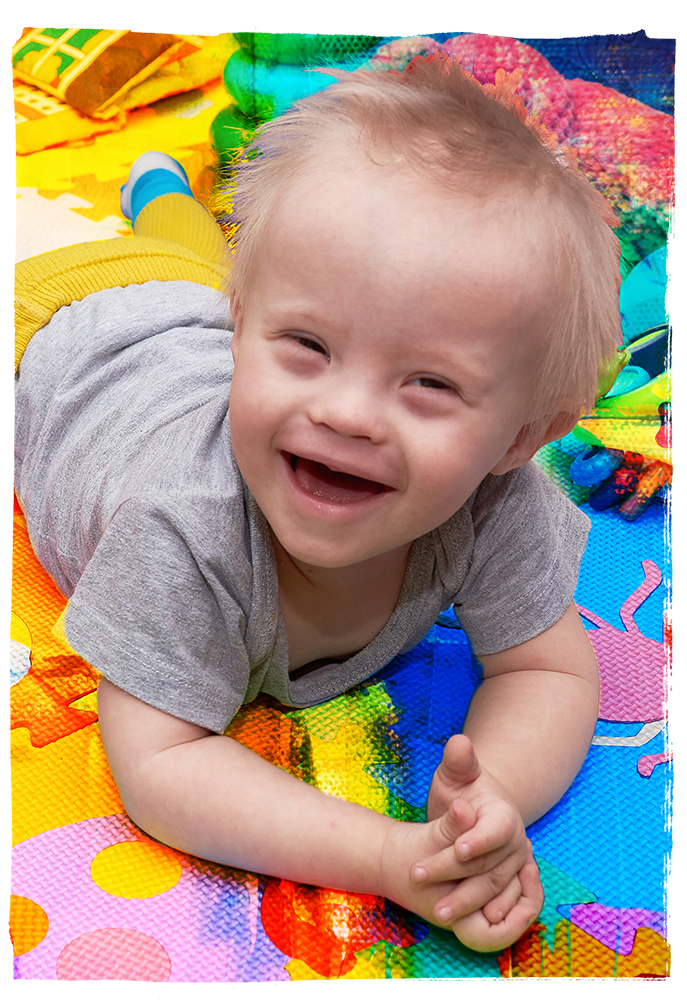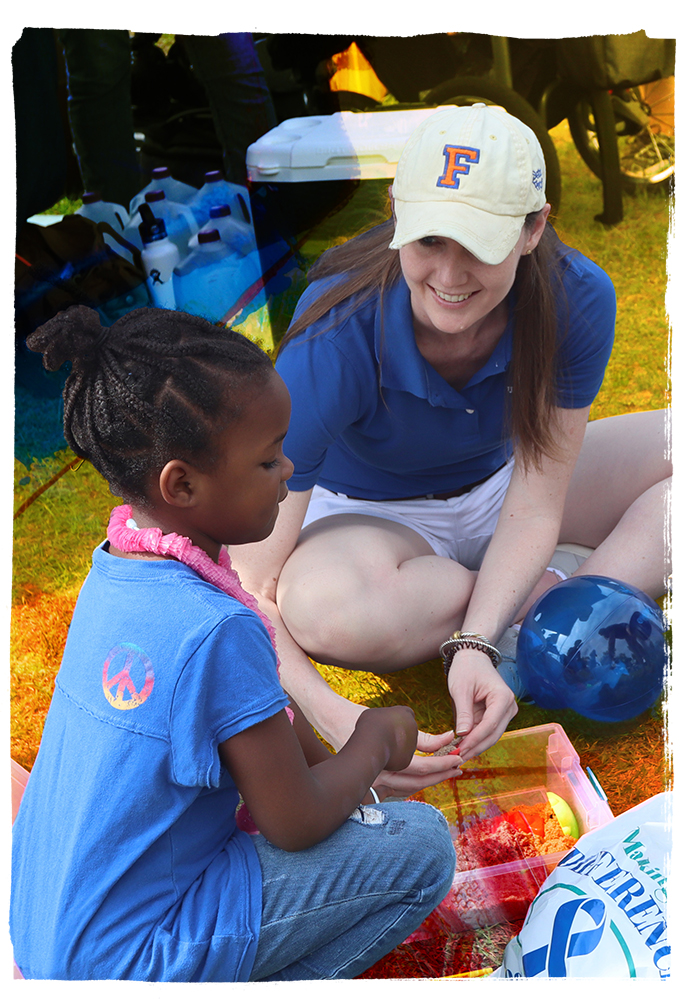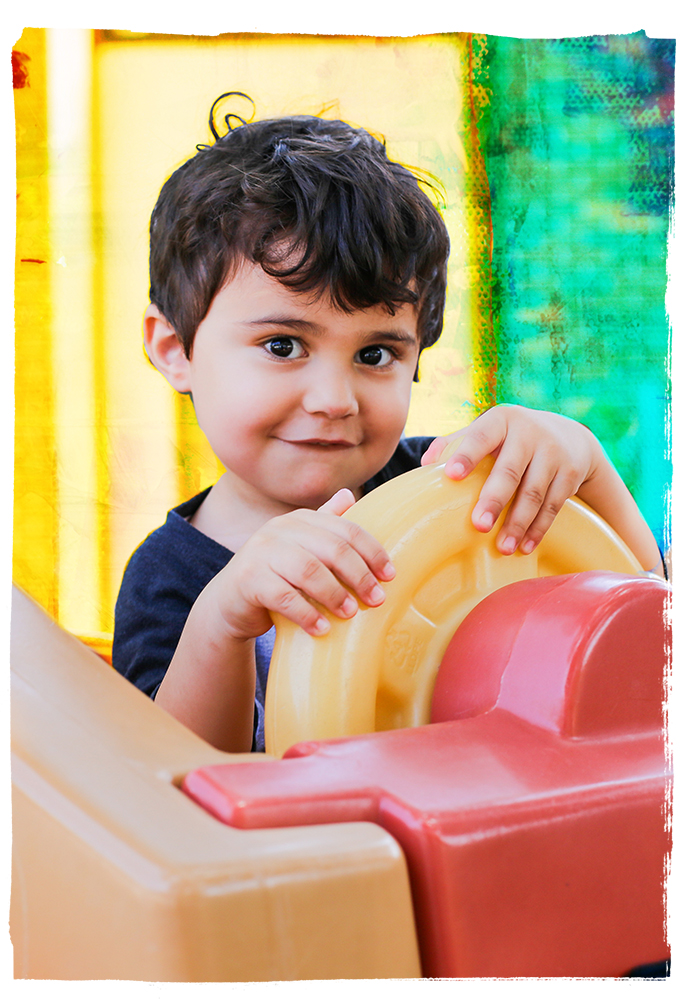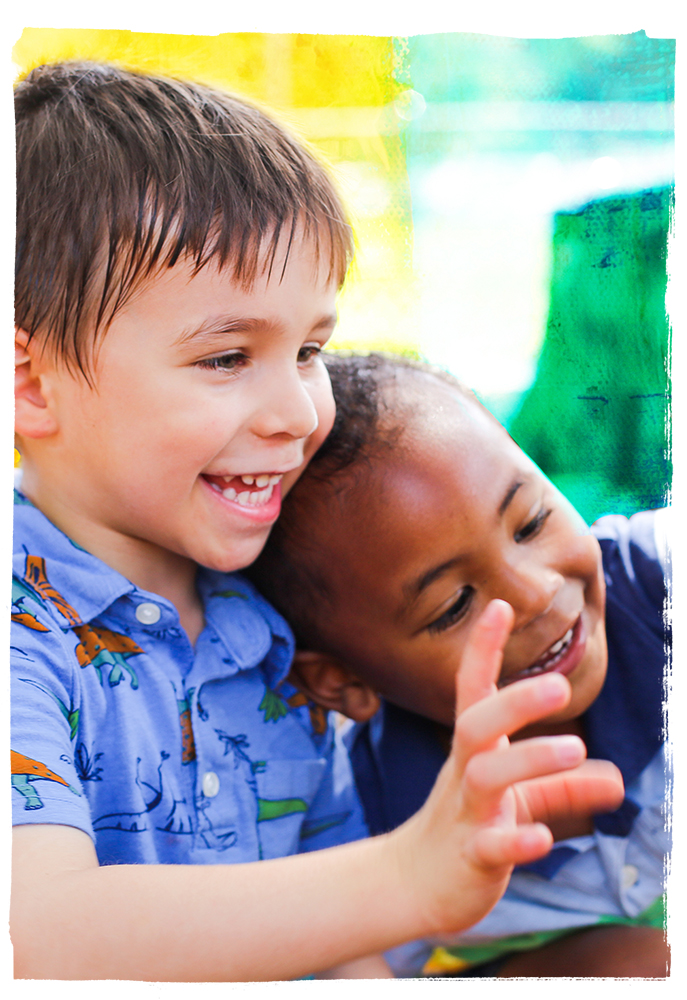
We believe to transform society, we must start by supporting the well-being of young children and their families. Through combined efforts over the last decade, our members and affiliates work every day to generate knowledge, prepare leaders and engage others to make a lasting, positive impact on the lives of children, their families, and their communities.
Jump to Section:

Engaging Partners
We connect with local, state, national and international partners to collaborate and positively impact early childhood development and learning within our community and beyond.
CHILD Center for Early Learning
Gainesville’s Southwest Advocacy Group (SWAG) — in partnership with the Anita Zucker Center, O2B Kids and Head Start — opened the CHILD Center for Early Learning, a model demonstration program for children and families that provides state-of-the-art early care and educational experiences. The CHILD Center is designed to support quality early learning experiences, family self-sufficiency and positive outcomes for children and families in the SWAG community.
Symposium Series
As an outcome of the 2017 UF Early Childhood National Summit Starting Ahead, Staying Ahead, the Center launched a symposium series of public discussions with internationally recognized experts in early childhood. Since 2018, these events have addressed areas of disability and early childhood policy, professionalization of the workforce, prenatal exposure to opioids, advocacy, leadership, equity and law.

Preparing Leaders
We mentor tomorrow’s early childhood leaders in research, policy, advocacy and practice.
Professional Development
Through partnerships in our community, across the nation and around the world, we have developed and researched Practice-based Coaching (PBC), a recommended early childhood coaching model that helps people use effective practices to support children’s development and learning. With a four-year, $1.6 million grant from the U.S. Department of Education’s Office of Special Education Programs, the PBC Data-Informed Decision-Making model is being implemented across diverse early childhood programs supporting infants, toddlers and preschoolers with or at risk for disabilities.
Beyond the Center
The Anita Zucker Center prepares tomorrow’s early childhood leaders to support young children’s health, development, learning and well-being and to advance the future of early childhood studies. Through connections with alumni, students, postdoctoral fellows and external partners, we witness the widespread impact we are making to the field beyond our Center.

Making an Impact
We build partnerships and implement research-based solutions with caregivers, practitioners and policymakers to transform the lives of young children everywhere.
Embedded Learning
The Anita Zucker Center, through collaboration with national partners and funding from the Institute of Education Sciences, has propelled research and practice around embedded learning. Focused on children with or at risk for disabilities, the embedded learning model helps practitioners and caregivers of young children learn how to partner and support children’s learning opportunities in everyday activities and routines at home, at preschool and in the community.
Social and Emotional Learning
BEST in CLASS began in 2008 with the goal of supporting young children’s social-emotional learning and decreasing their challenging behaviors. Designed to increase the use of evidence-based practices in community-based early childhood settings, BEST in CLASS supports practitioners’ use of these practices with children during everyday learning activities.

Generating Knowledge
We work to conduct and translate science to share and improve real-world practice and policy in early childhood.
Sunshine Portal
The Sunshine State Early Childhood Information Portal (The Sunshine Portal) project, funded through the Florida Division of Early Learning in the Florida Department of Education, is a pioneering Early Childhood Integrated Data System that includes information from health, education, financial, and social support sectors from across the early childhood mixed delivery system. The Early Childhood Policy Research Group (ECPRG), in collaboration with state and local agencies, leverages this data system to conduct research to enhance the well-being of young children and families across Florida. Through the Sunshine Portal, the ECPRG communicates research findings, providing in-depth data and visualizations at the community level. These insights into the lives of children and families are used by local, state, and national early childhood stakeholders.
The 3R’s of Early Learning
Our research shows there are three important processes that shape children’s development and early learning. At the Anita Zucker Center, we refer to these processes as the 3R’s of Early Learning: Relationships, Repetition, Routines ™. The 3R’s of Early Learning are important because they focus on how children learn in addition to what they learn.


From its inception and in collaboration with our partners, our Center has generated over $43M in grants and endowments. These funds have been used to advance practice and policy toward equitable and meaningful outcomes for all young children, their families and the practitioners who serve them.
We currently have
20
editorial appointments for Center members.
Research Funding Highlights
over $19.3 million
Embedded Instruction
over $12.5 million
BEST in CLASS
over $4.1 million
Data-Informed Policymaking

Maureen Conroy, Ph.D.
Outstanding Leadership Award
Council for Children with Behavioral Disorders,
Council for Exceptional Children, 2016
Patricia Snyder, Ph.D.
Kauffman-Hallahan-Pullen
Distinguished Researcher Award
Council for Exceptional Children,
Division for Research, 2021
Distinguished Professor
University of Florida, 2019
Outstanding Mentoring Award
Division for Early Childhood,
Council for Exceptional Children, 2015
Mary McLean, Ph.D.
Mary McEvoy Service to the Field Award
The Division for Early Childhood,
Council for Exceptional Children, 2015
Community Impact
Our work begins here at the University of Florida and in the surrounding greater Gainesville area. Partnerships with local governments, providers, schools and nonprofits provide the opportunity to apply research in meaningful ways that reach beyond our own community.
State Impact
In Florida we are able to collaborate with organizations and agencies in efforts to support the needs of young children and families. Through these statewide partnerships, we are able to leverage established networks to expand the impact of Center research.
National Impact
Working with colleagues in every region across the country, we are able extend our collective impact in areas of research, training, outreach and professional development. Through these national partnerships we are generating applicable solutions for early childhood needs.
Global Impact
We share our work and knowledge worldwide through research collaborations and international presentations. Our reach offers resources to families and caregivers and tools to practitioners who are supporting children’s development and early learning.

Pre-2011
- The David Lawrence, Jr. Endowed Chair in Early Childhood Studies is established and Dr. Patricia Snyder is appointed.
- The Center for Excellence in Early Childhood Studies is formally established.
2011-2012
- The Institute of Education Sciences awards the Center $4.1M for an efficacy study of BEST in CLASS in preschool settings.
- The Center, in partnership with others, is awarded a $6.5M Investing in Innovation grant in Early Childhood from the U.S. Department of Education.
- The Institute of Education Sciences funds the country’s first early intervention postdoctoral fellowship training program at the Center.
2013-2014
- The Anita Zucker Center for Excellence in Early Childhood Studies is officially named.
- Dr. Maureen Conroy is appointed to the Anita Zucker Endowed Professorship in Early Childhood Studies.
2015-2016
- The U.S. Department of Education’s Office of Special Education Programs supports 52 Unified Early Childhood ProTeach fifth-year students and five new doctoral students with awards totaling $2.2M.
- The Institute of Education Sciences awards the Center $3.5M for an efficacy study to examine the impact of professional development on embedded instruction.
- The Center earns a $1.2M development and innovation grant from the Institute of Education Sciences to create a web-based version of the BEST in CLASS-PK intervention.
2017-2018
- The UF Early Childhood National Summit convenes with experts from around the country for Starting Ahead, Staying Ahead.
- The Center launches an ongoing symposium series around the pressing issues and challenges of early childhood.
2019-2020
- The Center is awarded $1.4M by the U.S. Department of Education and the Institute of Education Sciences for Tools for Families, a new component of embedded instruction that focuses on how teachers can partner with families.
- The Center partners with Florida State University and Florida’s Early Steps program to scale up Florida Embedded Practices and Intervention with Caregivers across our state for the benefit of local providers, infants and toddlers with or at risk for disabilities and their families.
2021
- The Council for Exceptional Children Division for Research names Patricia Snyder as the 2021 Kauffman-Hallahan-Pullen Distinguished Researcher.
- Center members are awarded $1.6M by the U.S. Department of Education’s Office of Special Education Programs for Practice-based Coaching: Data-Informed Decision-Making.
- The U.S. Department of Education grants the Center $3.8M for an efficacy trial of Florida Embedded Practices and Intervention with Caregivers.

Since its inception in 2018, the A to Z’s of Early Childhood resources have been accessed by users in 89 countries.
The A to Z’s of Early Childhood began in 2018 as part of a UF initiative aimed at addressing society’s most urgent issues. This web-based information and resource hub provides quick tips and short videos on how to support young children’s development and learning. It has become an internationally recognized and trusted source for research-based information and resources designed to support caregivers, practitioners and policymakers.

